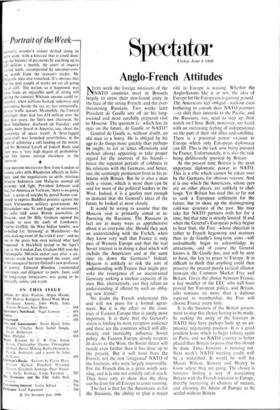Anglo-French Attitudes
NEXT week the foreign ministers of the NATO countries meet in Brussels largely to stress their new-found unity in the face of the erring French, and the ever- threatening Russians. Two weeks later President de Gaulle sets off on his long- awaited and most carefully prepared visit to Moscow. The question is : which has its eyes on the future, de Gaulle or NATO?
General de Gaulle is, without doubt, an old man in a hurry. He is obliged by his age to do things more quickly than perhaps he ought, to act at times offensively and without always appearing to take proper regard for the interests of his friends— hence the repeated periods of coldness in his relations with the Germans, and hence, too, the seemingly permanent frost in his re- lations with Britain. But he is also a man with a vision, which is more than can. be said for most of the political leaders in the West. Indeed, it is a quality rare enough to demand that the General's ideas of the future be looked at most closely.
It would be wrong to assume that the Moscow visit is primarily aimed at in- fluencing the- Russians. The Russians in fact are in- many ways as apprehensive about it as everyone else. Should they seek an understanding with the Frefich, when they know very well that France is only part of Western Europe and that the real Soviet interest is in doing a deal which will include the Americans and at the same time tie down the Germans? Indeed, Moicow is unlikely to risk the sort of understanding with France that might pro- voke the resurgence of an uncontained Germany seeking a nuclear capacity of its own. But, alternatively, can they refuse an understanding, if offered by such an oblig- ing new friend? No doubt the French understand this and will not press for a formal agree- ment. But it is the effect on the coun- tries of Eastern Europe that is surely most important. It is there that the General's vision is finding its most receptive audience and these are the countries which will ulti- mately and inevitably influence Soviet policy. As Eastern Europe slowly reopens 'its doors to the West, the Soviet-threat will recede even further than it has done up to the present. But it will have been the French, not the new 'integrated' NATO of the fourteen, who were largely responsible. For the French this is a prize worth win- ning, and it is one not entirely out of reach. They have only to show that the thing can be done for all Europe to come running.
The fact is that for the Americans, as for the Russians, the ability to play a major role in Europe is waning. Whether the Anglo-Saxons like it or not. the idea of Europe for the Europeans is gaining ground. The Americans feel obliged—without even bothering to consult their NATO partners —to shift their interests to the Pacific, and the Russians, too, need to step up their watch on China. Both, moreover, are faced with an increasing feeling of independence on the part of their old allies and satellites. There is a potential power vacuum in Europe which only European diplomacy can fill. This is the task now being pursued by France. Unfortunately, it is also the task being deliberately spurned by Britain.
At the present time Britain is the most important diplomatic power in NATO. This is a role which cannot be taken over by the Germans, for obvious reasons. And it is one which the Americans, whose eyes are on other places, are unlikely to chal- lenge. Yet Britain has used this so far not to seek a European settlement for the future, but to shore up the disintegrating cold-war structure of the • past. She may take her NATO partners with her for a time, but that time is Strictly limited. If and when the General's European policy begins to bear fruit, the Five—whose objection is rather to French hegemony and manners than to de-Gaulle's long-term aims—will undoubtedly begin to acknowledge its attractions,. and of course the General knows it. DE Gaulle has, and will be seen to have, the key to peace 'in Europe. It is difficult to think that anything could then preserve the present purely tactical alliance between the Common Market Five and Britain. Given the choice between France, a key member of the EEC who will have proved her European policy, and Britain, who remains no more than a dubious aspirant to membership, the Five will choose France every time.
It is the business of the British govern- ment to stop this choice having to be made. In seeking the unity of the fourteen in NATO they have perhaps 'built up an im- pressive negotiating position. It is a good position from which to begin talking again to Paris, and no NATO country is better placed than Britain to press that this should be done. Time, however, is running out. Next week's NATO meeting could well be a watershed. It would be well for Messrs Wilson, Stewart and Healey to know where they are going. The choice is between finding a way of associating Britain with the French initiative in Europe, thereby increasing its chances of success, and allowing the future of Europe to be settled without Britain.


































 Previous page
Previous page